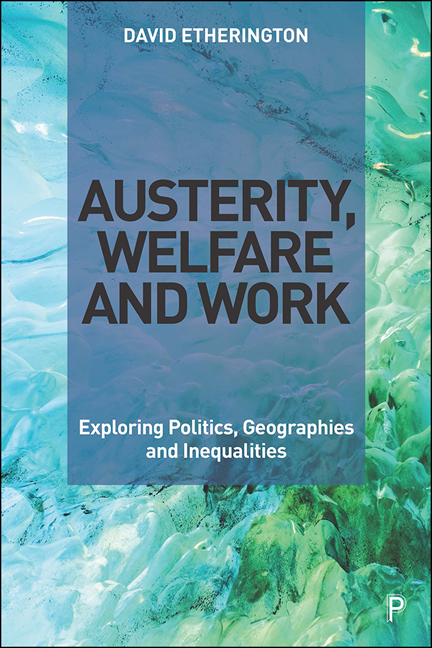Book contents
- Frontmatter
- Dedication
- Contents
- List of Tables and Box
- List of Abbreviations
- Notes on the Author
- Acknowledgements
- Preface
- 1 Introduction: the Crisis and Austerity Neoliberalism
- 2 Conceptualising Austerity, Welfare and Employment Relations
- 3 Embedding Neoliberal Austerity: from New Labour to the Conservative Government
- 4 Resisting Welfare Reforms and Work-First Policies
- 5 ‘Devolving’ Welfare Policies in Greater Manchester’s Precarious Economy
- 6 Challenging Welfare Conditionality and Insecure Work
- 7 Towards a more Inclusive Labour Market: Lessons from Denmark
- 8 Conclusions: Progressive Alternatives to Austerity
- Notes
- References
- Index
8 - Conclusions: Progressive Alternatives to Austerity
Published online by Cambridge University Press: 10 March 2021
- Frontmatter
- Dedication
- Contents
- List of Tables and Box
- List of Abbreviations
- Notes on the Author
- Acknowledgements
- Preface
- 1 Introduction: the Crisis and Austerity Neoliberalism
- 2 Conceptualising Austerity, Welfare and Employment Relations
- 3 Embedding Neoliberal Austerity: from New Labour to the Conservative Government
- 4 Resisting Welfare Reforms and Work-First Policies
- 5 ‘Devolving’ Welfare Policies in Greater Manchester’s Precarious Economy
- 6 Challenging Welfare Conditionality and Insecure Work
- 7 Towards a more Inclusive Labour Market: Lessons from Denmark
- 8 Conclusions: Progressive Alternatives to Austerity
- Notes
- References
- Index
Summary
The UK government still upholds the idea that selfregulating markets represent the ideal economic model, despite two years of expansionary fiscal contraction mounting criticism not only from heterodox and feminist economists but also from the IMF, evidence that shows all the hallmarks of a depression with either very low or zero growth, a clear lack of effective demand, and, in complete contrast to their intentions and predictions, increases in government borrowing owing to falling tax revenues. … Explaining the rigid adherence to these policies and why the ideas of feminist and heterodox economists are overlooked is clearly important. (Perrons, 2012)
So public ownership of the big five is essential. Even if the government bought all the shares at market price it would cost only a one-off 3% of GDP (not that full compensation to shareholders is merited). That could easily be financed by the issuance of government bonds and serviced easily with the revenues and profits from the big five. The top executives of these banks would then be paid civil service salaries and have no shares – bank workers and trade unionists would sit on the boards to ensure accountability. Public ownership does not mean more bureaucracy – on the contrary, it means more democracy. (Roberts, 2018: 3)
Introduction
The cause of the economic crisis is rooted in the tendencies towards over-accumulation and falling rate of profit. The state plays an active role in these processes in two important ways: first, through the deregulation and liberalisation of the financial system leading to financialisation of the economic system, which exacerbates the structural problems of the economy. Second, the slashing of public spending and imposing massive cuts to the welfare state have created problems in relation to increasing poverty and posing problems for the reproduction of labour.
Chapter 5 illustrates the broad and diverse nature of strategies and counter discourses to austerity and labour discipline both inside and outside the workplace. In Chapter 7, an analysis of Denmark and the Danish system of welfare and employment relations provides an example of the type of ‘progressive policies’ that the Corbyn-led Labour Party was aiming towards.
- Type
- Chapter
- Information
- Austerity, Welfare and WorkExploring Politics, Geographies and Inequalities, pp. 155 - 176Publisher: Bristol University PressPrint publication year: 2020



